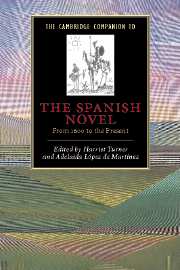Book contents
- Frontmatter
- 1 On the novel: mirror and text
- Part 1 Since Cervantes
- Part 2 The nineteenth century
- Part 3 The twentieth century
- 10 From the Generation of 1898 to the vanguard
- 11 The testimonial novel and the novel of memory
- 12 Questioning the text
- 13 Women and fiction in post-Franco Spain
- 14 Cultural alliances: film and literature in the socialist period, 1982–1995
- 15 The novel beyond modernity
- 16 Writing about writing
- Bibliography
- Index
- Series List
10 - From the Generation of 1898 to the vanguard
from Part 3 - The twentieth century
Published online by Cambridge University Press: 28 May 2006
- Frontmatter
- 1 On the novel: mirror and text
- Part 1 Since Cervantes
- Part 2 The nineteenth century
- Part 3 The twentieth century
- 10 From the Generation of 1898 to the vanguard
- 11 The testimonial novel and the novel of memory
- 12 Questioning the text
- 13 Women and fiction in post-Franco Spain
- 14 Cultural alliances: film and literature in the socialist period, 1982–1995
- 15 The novel beyond modernity
- 16 Writing about writing
- Bibliography
- Index
- Series List
Summary
The period from about 1900 until the Spanish Civil War (1936-9) is often considered a second Renaissance in Spanish culture, a “Silver Age,” as José Carlos Mainer calls it. The novel of this period was particularly precocious, showing early signs of the artistic innovations that came to be called modernism in other European literatures. From 1870 onwards the novel had come into its own as a major cultural form in Spain for its ability to mirror a bourgeois society anxious to read portraits of itself. By the turn of the century, however, a growing intelligentsia was losing patience with middle-class values and their political and artistic manifestations. The Restoration government, which replaced the revolutionary initiatives of 1868-74, had created a peace and stability that Spain had not enjoyed during most of the earlier nineteenth century; at the same time, intellectuals were disgusted with its corrupt politics and support of conservative Spanish institutions such as the church hierarchy and the landed aristocracy. Modern philosophy and ideologies gave the intellectuals and writers the impetus they needed to seek new social and cultural forms.
“¡Adentro!” (“Turn inward”) exhorted Miguel de Unamuno in 1900,arguing for a reorientation of the collective psyche away from the material,scientific, technological aspects of life to the internal and spiritual.
- Type
- Chapter
- Information
- The Cambridge Companion to the Spanish NovelFrom 1600 to the Present, pp. 155 - 171Publisher: Cambridge University PressPrint publication year: 2003

